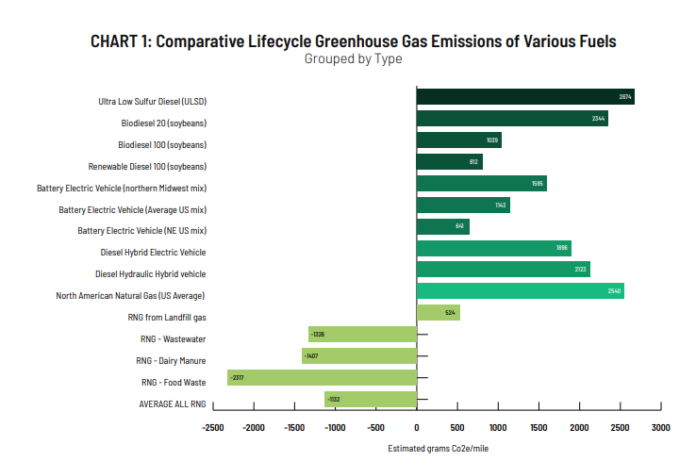NGO Energy Vision’s The Refuse Revolution report on alternative fuels and new vehicle technologies for waste and recycling collection truck fleets assesses biodiesel and renewable diesel, fossil and renewable natural gas, hybrid technologies, battery electric vehicles (BEVs), DME, and hydrogen for cost, performance, and climate and health impacts.
The report compares “lifecycle” GHG emissions of each option, covering fuel production, transport and use. It finds that BEV trucks’ claim to be zero-emissions isn’t accurate. The heavy weight of their batteries causes them to stir up road dust and increases tire wear, generating particulate pollution that may be greater than that of diesel trucks. BEVs also have considerable lifecycle GHG emissions because they charge their batteries on a 58% fossil fuel-powered electric grid.
Trucks with natural gas engines powered by renewable natural gas (RNG) fuel achieve the greatest benefits at the lowest cost, the report finds. RNG trucks rated highest for performance, cost, and cutting lifecycle GHG emissions and health-damaging pollutants. Since RNG is made from captured methane biogases emitted by decomposing organic wastes, scaling up its production could cut overall U.S. methane emissions 15%. This would take us halfway to the global goal of reducing methane emissions 30% by 2030, deemed essential by UN and IPCC scientists in order to avoid catastrophic climate change beyond 1.5 degrees C.
“A strong, meaningful legislative agenda must include clean transportation and reducing methane emissions,” says Rep. Paul D. Tonko of New York’s 20th District. “This Energy Vision report shows that businesses can be resourceful in producing the low- and no-carbon fuels and technologies essential for a more fair, just and sustainable economy.”
“There is no ‘one size fits all’ solution for fleets,” adds Matt Tomich, Energy Vision’s president. “All fuel and technology options we assessed have meaningful climate and clean air advantages over petroleum diesel. Some have more than others.”
“We need to prioritize clean energy strategies that reduce methane,” states Joanna Underwood, Energy Vision’s founder. “Fleet managers are not making procurement decisions in a vacuum; they’re connected to a complex web of global climate and environmental issues. The Refuse Revolution is a resource to help navigate it and choose the options that will do the most good.”
Read the full report here.




